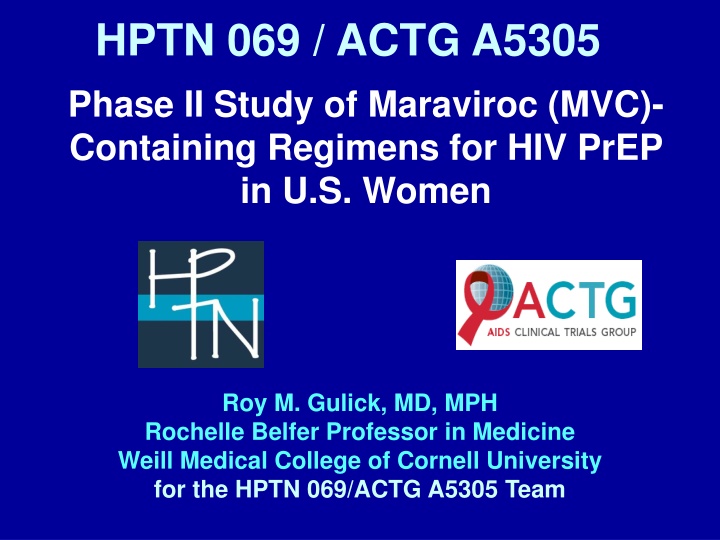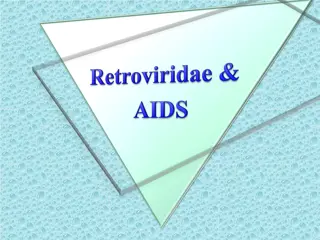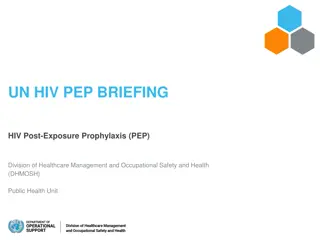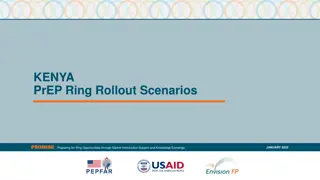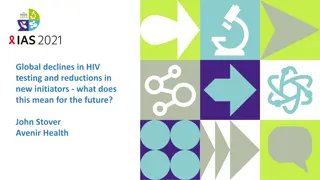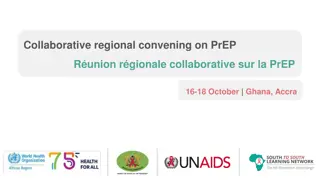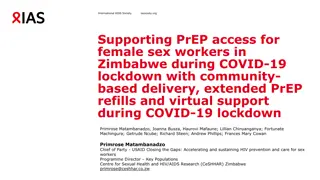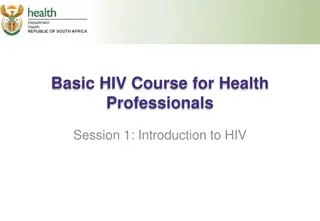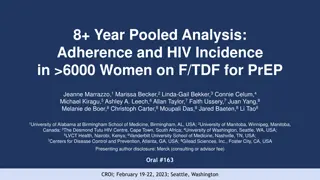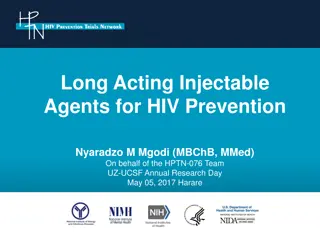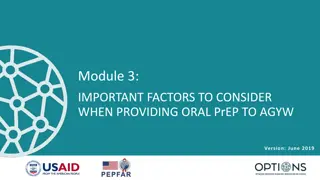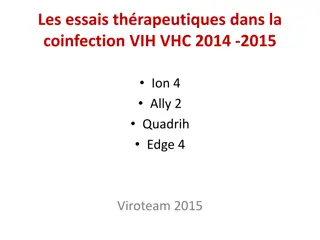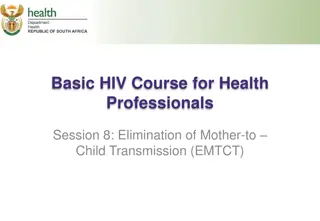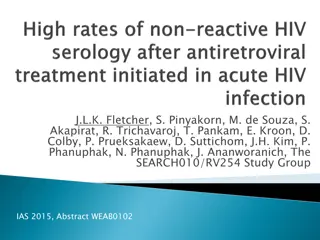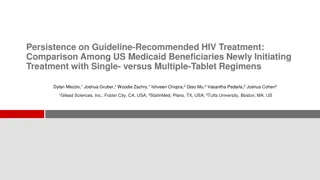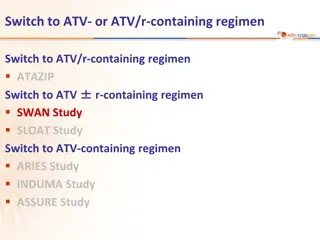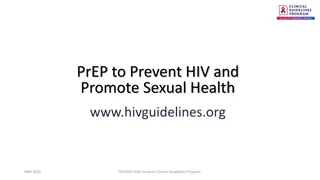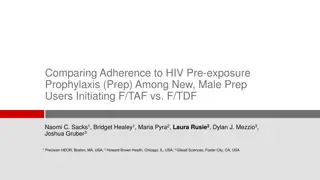Study of Maraviroc-Containing Regimens for HIV PrEP in U.S. Women: HPTN 069/ACTG A5305 Phase II Study
HPTN 069/ACTG A5305 is a Phase II study evaluating the safety and tolerability of Maraviroc (MVC)-containing regimens compared to Tenofovir/emtricitabine (TDF/FTC) for HIV Pre-Exposure Prophylaxis (PrEP) in at-risk women. The study involves a randomized, double-blind, placebo-controlled design with different drug regimens administered orally once daily over 48 weeks. The primary objective is to assess the safety and tolerability of MVC, MVC+FTC, MVC+TDF, and TDF+FTC. Results suggest MVC-containing regimens are generally safe and well-tolerated with low seroconversion rates. This study is the first of its kind in U.S. women, providing valuable insights into HIV prevention strategies.
Download Presentation

Please find below an Image/Link to download the presentation.
The content on the website is provided AS IS for your information and personal use only. It may not be sold, licensed, or shared on other websites without obtaining consent from the author.If you encounter any issues during the download, it is possible that the publisher has removed the file from their server.
You are allowed to download the files provided on this website for personal or commercial use, subject to the condition that they are used lawfully. All files are the property of their respective owners.
The content on the website is provided AS IS for your information and personal use only. It may not be sold, licensed, or shared on other websites without obtaining consent from the author.
E N D
Presentation Transcript
HPTN 069 / ACTG A5305 Phase II Study of Maraviroc (MVC)- Containing Regimens for HIV PrEP in U.S. Women Roy M. Gulick, MD, MPH Rochelle Belfer Professor in Medicine Weill Medical College of Cornell University for the HPTN 069/ACTG A5305 Team
Disclosure I have no financial relationships with commercial entities.
HPTN 069 / ACTG A5305: Background Tenofovir/emtricitabine (TDF/FTC) only drugs approved for HIV PrEP associated with GI, renal, and bone effects used commonly for HIV treatment may select drug resistance Maraviroc (MVC) CCR5 antagonist with activity against R5 virus approved / well-tolerated in HIV+ individuals concentrates in the genital tract / rectum not used commonly for HIV treatment selects drug resistance uncommonly no interactions with contraceptives
HPTN 069 / ACTG A5305: Status Parallel to cohort of men who have sex with men (MSM) (N=406) Gulick, et al CROI 2016 #103 MVC-containing regimens generally safe and well-tolerated compared to TDF/FTC 5 seroconversions (incidence 1.4%) all with R5 virus without antiretroviral drug resistance and associated with no or low drug concs. First randomized interventional study of HIV PrEP regimens in U.S. women
HPTN 069 / ACTG A5305: Hypothesis MVC-containing regimens will be generally safe and well-tolerated when compared with TDF+FTC given as HIV PrEP in at-risk women
HPTN 069 / ACTG A5305: Study Design Study population HIV-1-uninfected adults (>18 yo); born female History of condomless vaginal or anal intercourse with at least one HIV+ or unknown sero-status man within 90 days No injection drug use Adequate safety labs; est. CrCl >70 mL/minute; HBsAg (-) Randomized, double-blind, placebo-controlled study of U.S. sites of the HPTN + ACTG: MVC 300 mg (alone) MVC 300 mg + FTC 200 mg MVC 300 mg + TDF 300 mg TDF 300 mg + FTC 200 mg Study regimen: 3 pills (w/ placebos) orally once daily Visits: BL, wks 2, 4, 8, then every 8 wks to wk 48, 49 } daily dosing with matching placebos
HPTN 069 / ACTG A5305: Objectives PRIMARY: To assess the safety and tolerability of MVC, MVC+FTC, MVC+TDF, and TDF+FTC over 48 wks Safety: grade 3 or higher adverse events Tolerability: rate and time to permanent study drug d/c SECONDARY: safety: grade 2 events; grade 1 events resulting in study drug discontinuation; lipid changes; bone mineral density drug concentrations adherence, sexual behavior, quality of life EXPLORATORY: characterize participants with new HIV infection drug concentrations, HIV RNA, drug resistance, and viral tropism
HPTN 069 / A5305 : Statistical Methods All analyses are intent-to-treat Primary analyses use Kaplan-Meyer survival analysis and comparisons between study arms use chi-square, t-test or log-rank testing P-values are two-sided Powered to estimate safety and tolerability, not efficacy. Reviewed at least biannually by the HPTN Study Monitoring Committee (SMC) for safety
HPTN 069 / ACTG A5305: Participants N = 188 individuals enrolled 100% female at birth Median age 35 (range 18, 61) 65% Black, 17% Latina, 27% White, 8% other (participants could report more than one) 44% high school education or less, 50% some college or more, 4% advanced degrees 7 (4%) had STIs during study screening: 3 chlamydia, 4 syphilis
HPTN 069 / A5305: Disposition 188 randomized; 186 (99%) started study drugs 160 (85%) completed the study 19 (10%) prematurely discontinued study follow-up 8 (4%) lost to follow-up 1 death (suicide) 36 (19%) prematurely discontinued study treatment 33 discontinued treatment but continued follow-up 3 discontinued both treatment and follow-up most common reasons: 16 pt request, 9 pregnancy No differences by study arm in: proportion who discontinued study drugs (p>0.2) time to permanent study drug discontinuation (p=0.2)
HPTN 069 / A5305: Adverse Events 48 grade 3-4 AEs in 35 (19%) participants No significant differences among study arms (p>0.05) 11 of 48 events were considered related: abnormal weight loss, back pain, congenital anomaly in offspring (2), depression, headache, hypophosphatemia, increased LDL, spontaneous abortion (2), vitamin D deficiency Grade 2 or higher AE occurring in >5%: hypophosphatemia (13%), headache (7%), and UTI (6%) Selected GI and renal AE (grades 2-4, N=21) 24 events: grade 2 (n=23), grade 3 (n=1), grade 4 (n=0) Overall rates: diarrhea (3%), nausea (4%), vomiting (3%), unintentional weight loss (2%), increased creatinine (1%) 4 (2%) had STI diagnosed during study f/u: 1 GC, 3 Chlam
HPTN 069 / A5305: Drug Concentrations Plasma Drug Concentrations: All study drugs in regimen detectable in 65% (91 of 141 samples) at week 24 60% (75 of 126 samples) at week 48 No difference between the study arms (p>0.6)
HPTN 069 / A5305: HIV Infections NO new HIV infections during the study Annual incidence rate 0% [95% CI: 0%, 2.5%]
HPTN 069 / A5305: Conclusions MVC-containing regimens were comparably safe and well-tolerated to TDF+FTC when used over 48 weeks for HIV PrEP by U.S. women. comparable specific GI and renal toxicities Adherence to study drugs, as estimated by detectable drug concs., was 60-65%. NO new HIV infections in this cohort of at-risk women (annual incidence 0%) low number of on-study STIs MVC-containing regimens could be considered for testing in HIV PrEP clinical efficacy trials.
HPTN 069 / A5305: Coming Women s Tissue Substudy (n=42) Combined Men s and Women s Bone Mineral Density Substudy (200 men and 200 women; n=400) Men s and Women s Adherence, Behavioral, and Quality of Life Data (N=594)
HPTN 069 / ACTG A5305 Acknowledgements (1) HPTN 069/A5305 Protocol Team Chair: Trip Gulick Co-Chairs: Ken Mayer and Tim Wilkin Statisticians: Ying Chen and Alicia Young Co-investigators: Rivet Amico, Adriana Andrade, Todd Brown, Sally Hodder, Raphy Landovitz, Joe Margolick, Ian McGowan, Bruce Schackman Laboratory Support: Sue Eshleman (virology), Craig Hendrix and Mark Marzinke (pharmacology), Paul Richardson (QA/QC) DAIDS: Wairimu Chege, Karin Klingman, Fulvia Veronese, Usha Sharma
HPTN 069 / ACTG A5305 Acknowledgements (2) HPTN 069/A5305 Protocol Team (continued) Protocol Specialists: Phil Andrew and Marybeth McCauley Data Manager: Leslie Cottle Field Representative: Cheryl Marcus DAIDS pharmacists: Ana Martinez and Bijal Patal Pharmaceutical representatives: Alex Rinehart (ViiV), Jim Rooney (Gilead) Community Program Manager: Jonathan Lucas
HPTN 069 / ACTG A5305 Acknowledgements (3) Participating HPTN and ACTG sites (N=12): Case Western; Fenway Health; George Washington; Johns Hopkins; UCLA; Rutgers-New Jersey Med. School; UNC, Chapel Hill; U Penn; U Pitt; U Puerto Rico; U Washington; Weill Cornell HPTN Laboratory Center: Johns Hopkins Gilead (TDF, FTC) and ViiV (MVC) HIV Prevention Trials Network (HPTN) AIDS Clinical Trials Group (ACTG) Division of AIDS, NIAID, NIH The Study Volunteers!
